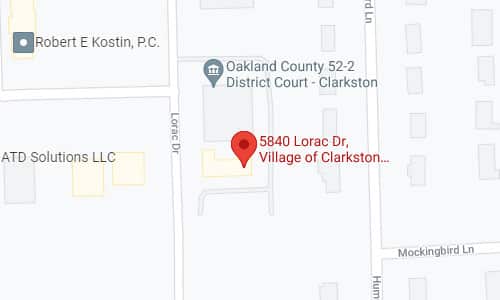
A DUI arrest has the potential to affect your life on multiple levels. Not only will it appear on your criminal record, but if you’re looking for a new job or hold a state-issued professional license, that single arrest may lead to career setbacks. Michigan employers usually have strict policies about arrests and convictions, especially in industries where safety, trust, or regulatory compliance are involved. Even if the charge doesn’t lead to a criminal conviction, it may still show up in a background check or raise questions about your fitness to do your job.
For licensed professionals in Michigan, the risk goes further. Nurses, teachers, lawyers, and commercial drivers may face disciplinary action or license suspension, even before a court makes a final decision. In this guide, we’ll go over how a DUI arrest in Flint, Clarkston, or anywhere else in the state can affect your ability to keep working in your chosen field.
How a DUI Arrest Can Affect Your Job in Michigan
A DUI charge can disrupt your employment even before your first court date. Many employers and licensing boards in healthcare, education, transportation, finance, and public service have internal policies that allow disciplinary action as soon as you’re arrested. If you’re a nurse, teacher, commercial driver, or someone who holds a position of public trust, you may face suspension, reassignment, or termination based on the arrest alone.
Some jobs require you to report any criminal charges right away. This is often the case for licensed healthcare professionals, educators, law enforcement officers, state employees, and government contractors. Failing to report an arrest for operating while intoxicated (OWI) may lead to disciplinary action for violating employment terms, even if your case is later dismissed.
Public employers, such as school districts or government agencies, usually take quicker action after an arrest. Private employers may have more discretion, but they’re not required to wait for a criminal conviction. If your role involves handling sensitive information, working with vulnerable populations, or managing finances, you may be removed from your position while the case is pending.
Do You Have To Tell Your Employer About a DUI Charge?
Whether you must tell your employer about a drunk driving arrest depends on your job, your employment agreement, and the licensing rules that apply to your field. In many positions, especially those tied to public safety or licensed professions, disclosure is required. If you’re under contract or part of a union, your reporting duties may be spelled out in detail, either in your contract or the employee handbook.
Some industries tie continued employment to a clean criminal or driving record or prompt disclosure of any legal issues. For example, jobs in education, healthcare, transportation, and financial services tend to require you to notify your supervisor or HR department as soon as you’ve been arrested. If you delay reporting or try to keep it quiet, your employer may impose license penalties for violating policy, even before you appear in court.
Background reports can also raise issues long after the arrest. If you apply for a new job while charges are pending, the arrest may appear during pre-employment screening. Even if the case was dismissed, the original arrest could still be visible unless it’s legally expunged or suppressed, which can take time.
Professional Licensing Boards That May Take Action After a DUI
Professional licensing bodies in Michigan (e.g., the Michigan Department of Licensing and Regulatory Affairs) have the authority to investigate any conduct that could affect your ability to perform your duties. Even a first-time offense may trigger disciplinary action or additional conditions before your occupational license can be renewed or maintained.
Michigan Board of Nursing
If you’re a licensed nurse, you must report any criminal charges, including a DUI. The Board may open an investigation to determine if substance use could affect your ability to provide safe care. You may be asked to complete a substance use evaluation or enter a monitoring program. In some cases, your license may be placed on probation or temporarily suspended.
Michigan State Bar
If you’re applying to the bar or already licensed as an attorney, a DUI can raise concerns about your fitness to practice law. The Character and Fitness Committee reviews all new applicants and may delay or deny admission based on an open criminal case. For attorneys already practicing, the Attorney Grievance Commission may investigate and impose license penalties if the conduct reflects poorly on the profession.
Michigan Board of Medicine
Physicians are required to report any criminal charges, including drunk driving arrests. The Michigan Medical Board can request medical evaluations or treatment records, especially if there’s evidence of alcohol abuse. Restrictions may be placed on your license, and you could be ordered to enter a monitoring agreement through the Health Professional Recovery Program (HPRP).
Department of Insurance and Financial Services (DIFS)
If you’re licensed to sell insurance or manage financial accounts, a DUI arrest may be viewed as a character issue. The department may suspend, revoke, or refuse to renew your occupational license, especially if you fail to disclose the arrest.
State of Michigan Teaching Certification
Certified educators must report any criminal charge to the Michigan Department of Education. A DUI may prompt an ethics review or administrative investigation. Depending on the outcome, you may be issued a warning, placed on a disciplinary agreement, or have your certification suspended.
Commercial Driver’s License (CDL) Holders
Michigan law imposes automatic penalties on commercial driver’s license holders arrested for DUI, even if they were operating their personal vehicles at the time. Federal Motor Carriers Safety Regulations dictate that a single DUI arrest will result in an automatic driver’s license suspension, which can cost you your job. For many commercial drivers, there’s no second chance once a CDL is suspended.
Other Licensed Professions
Many other professions may also face licensing sanctions. They include real estate agents, accountants, private security contractors, paramedics, social workers, and child care providers. Each board or agency has its own reporting rules and disciplinary standards. An arrest may lead to formal discipline, additional supervision, or temporary loss of the right to work in your field.
Expungement Laws and Set-Asides
In Michigan, a first-time OWI conviction became eligible for expungement starting in 2021 under the state’s Clean Slate laws. This means you may be able to ask the court to set aside the conviction, but only if you meet certain conditions. To be eligible, you must wait five years after completing probation requirements or any jail time, and you can’t have multiple DUI convictions on your criminal record.
If your DUI was dismissed or you were found not guilty, the arrest may still appear in criminal background checks unless you file a petition to remove it from public record. Expungement removes the criminal conviction from most background searches, but it doesn’t always erase it from licensing board records or mandatory disclosure forms.
An expungement can improve your chances of finding a new job or renewing your license, but the legal process is not automatic. You’ll need to petition the court, attend a hearing, and show that you’ve stayed out of trouble. It’s also wise to check how your licensing board treats expunged OWI convictions before assuming the record won’t be held against you.
What You Can Do To Protect Your Career After a DUI Arrest
The steps you take after a DUI arrest can determine whether you keep your job or license. The first thing you should do is hire a DUI defense lawyer who may be able to challenge the original traffic stop, review the test results, and potentially get the charges reduced or dismissed. (A reduced charge may carry fewer consequences with your licensing board or employer.) In some cases, a criminal defense attorney may also help you avoid formal charges through early negotiation with the prosecutor.
You may also want to show you’re addressing the arrest. For example, you may choose to complete a substance use evaluation, begin treatment, or attend support meetings. Collecting positive references, performance evaluations, or letters from supervisors can also make a positive impact if your board or employer opens an investigation.
How Shaun R. Marks Can Help
Attorney Shaun R. Marks has represented thousands of clients across Michigan in DUI and criminal defense cases. He understands how an arrest can affect your career, especially if you hold a state-issued license or work in a regulated profession.
Mr. Marks holds certifications in field sobriety testing and breath testing equipment, which allows him to challenge the accuracy of the evidence in your case. He examines whether police followed proper procedures and whether the stop or arrest can be contested in court. In many cases, he’s able to negotiate for charge reductions or plea bargains that help protect both your criminal record and your professional standing.
If your license is at risk, Attorney Marks can help you prepare for hearings before your licensing board, respond to formal complaints, and gather evidence that supports your ability to continue working. As your Michigan OWI / DWI defense attorney, his goal is to help you keep your career on track while resolving the case as favorably as possible.
Arrested for DUI? Get a Free Consultation
If you’re arrested for drunk driving in Michigan, you may face job loss, license suspension, or professional discipline before your case is even resolved. If you hold a position of trust or work in a licensed profession, the arrest alone may be enough to trigger an investigation or employment action.
Attorney Shaun R. Marks has helped clients across Michigan respond to DUI arrests, with a focus on preserving their careers and professional futures. If you’ve been arrested for drunk driving and are concerned about your job or license, contact Shaun R. Marks today to schedule a confidential consultation.

Criminal defense attorney Shaun Marks had received his Juris Doctor degree with Cum Laude honors from the Detroit College of Law in 1994. He received his undergraduate degree in Criminal Justice from the University of Michigan-Flint. He has served in the U.S. Air force Security Police and as an Assistant city Attorney for the City of Flint. He has also worked in the office of former U.S. Senator Donald Riegle. Attorney Marks has successfully represented thousands of clients in criminal matters in state and federal courts across Michigan.


